Non-Alcoholic Summer Drinks
SUNDAY JULY 25th, 2021
It would be difficult for me to write a fluff piece on non-alcoholic drinks. That’s not simply because a fluff piece is generally rare for me (unless I’ve been paid good money to do so, which is also rare) but because I consider the topic of non-alcoholic drinks to be an incredibly important one these days, a topic with many layers and complexities. Mostly I want to encourage honest discourse on the darker side of alcohol, the side that far too many of us are well acquainted with.
Today there is a myriad of non-alcoholic drinkers out there that are often forgotten about: under-agers, sober people, the health-conscious and those with a general consensus that too much alcohol isn’t ideal for the human body, spirit and mind. Kids and adults alike should all have easy access to well crafted, non-alcoholic great tasting drinks regardless of whether we are at a restaurant, a park, the beach or at home.

My original intention for this post was recipe based. I wanted to create some herbaceous and tasty nonalcoholic recipes and drink ideas that people like me, who wanted options, would be able to indulge in all summer long. I wanted to refine my usual mocktails and create more depth in my sips. I had been needing to keep my own drinking in check so this endeavor was all of that and more.
My intuition tells me that part of the reason that good non-alcoholic drinks are still not the norm is because we are still hesitant to talk about some of the negative effects of booze… or not as much as we should. For my part, I want to at least try to talk about it here in this post, at least my own perspective, not just from the daughter of an alcoholic but a bartender, spirits writer and a jolly drinker.
There is a dark side to alcohol. There always has been, and we often don’t talk about it – about how alcohol in small or large amounts affect us, how as humans we use it and abuse it, and how little we still understand about its effects on us.
Alcoholic drinks have been around since Babylon, since ancient Egypt, since basically forever. It’s assumed that alcohol predates humans with primates eating fermented fruit. The history of alcohol is, simply put, long, and it will continue to exist in some form or another regardless (or maybe because) of the dark side of alcohol. This dark side co-exists with alcohol, just like its “medicinal” lighter side. This dark and light together, makes sense to me, always has.
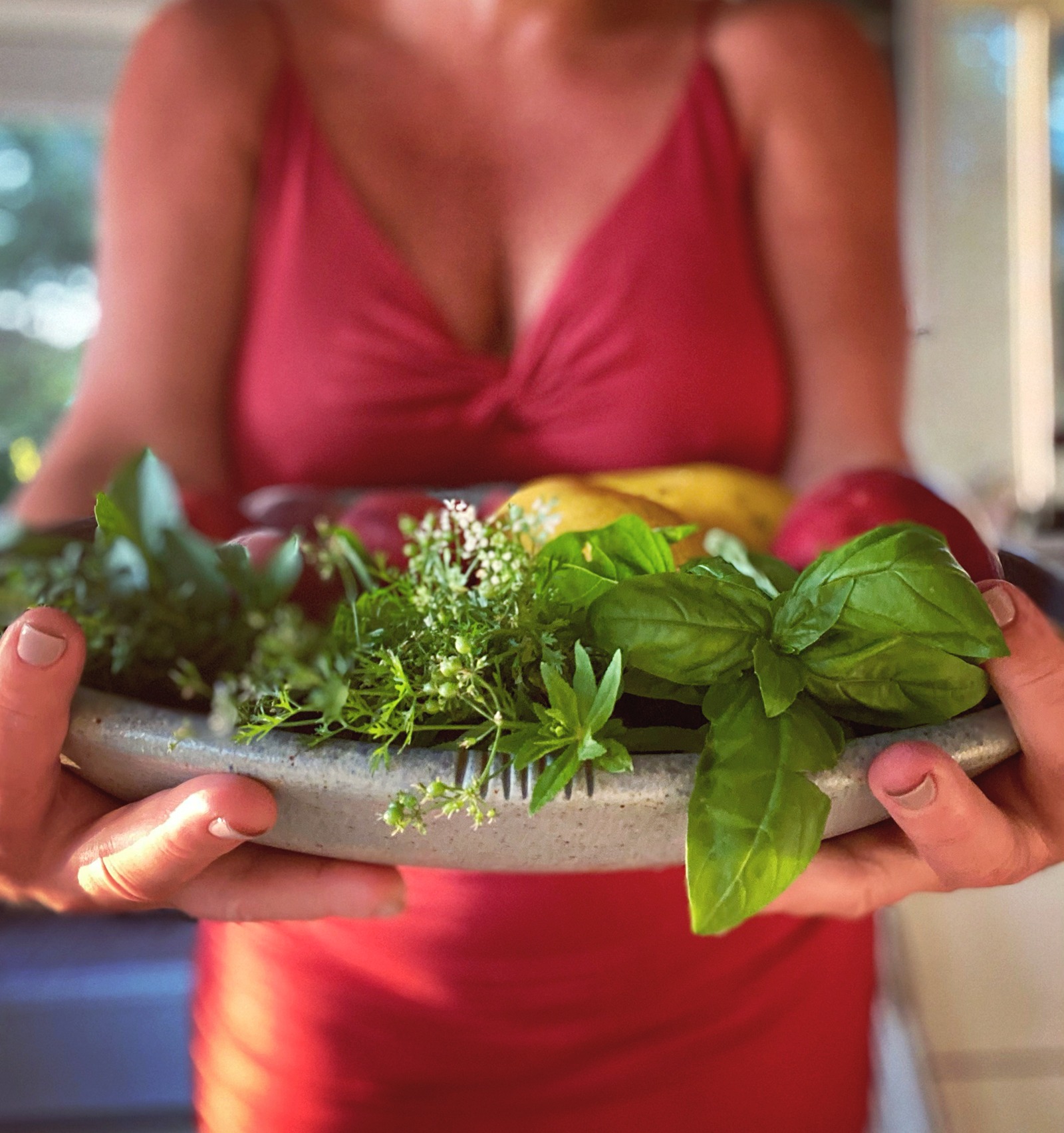
I’ve spent a great deal of time in my food writing career writing about cocktails and spirits. This is not just because I enjoy drinking (though, I do). It’s more so that I’m interested in the whole process, the ingredients used, the artisanal minds that create the spirits, and the history of spirits, which I have been lucky enough to explore all over the world through my agricultural travels. Alcohol, like food is everywhere in the world and it has always fascinated me, in the same way food has, as people have.
My own artisanal mind is extremely attracted to the depth and versatility of spirits, cocktails, wines and even beer, which I can appreciate but don’t have a palate for. I’ve tried to write about booze in a way that shows that it’s more than something to get drunk on – whether it’s about wine country cocktails, gin, vodka, vermouth, or my super famous egg nog recipe.
In part, alcohol’s ubiquity represents how much we humans try to tinker with how we want to feel in response to the natural human way our bodies and minds can get out of balance. Alcohol certainly is not the only mind and body altering substance out there. There are plenty, and human beings will probably always find them because our brains are complicated and our feelings potent and we want to control them in some way.

My take on booze has always been unique. My personal history with alcohol since I started drinking was always more peripheral. As a control freak, I’m not into too much mind altering, it scares me. While I have abused my fair share of alcohol, there is something inside my brain that, more often than not, won’t let me go too far. I have been gifted with a good off switch for booze and, more importantly, the physical ability to choose not drink when I know it won’t serve me. Unlike most alcoholics, I can stop drinking at any time because, even when I’m drinking, I can foresee the possible consequences of drinking in enough time to stop.
Alcoholism is a problem that affects us all. I don’t know anyone that isn’t affected by it in some way.
Research on alcoholism is still fairly new as brain science continues to develop. While recovery programs have existed for some time now, new holistic treatments for alcoholism continue to develop, too. As research evolves so has our understanding and discourse. Despite the advances we can still say that there is no cookie cutter answer to why some people are alcoholics and others not or why some people can recover from alcoholism or not; some things in life simply can’t be explained like that. This is easy for me to accept, I’m not a person who needs to understand everything.
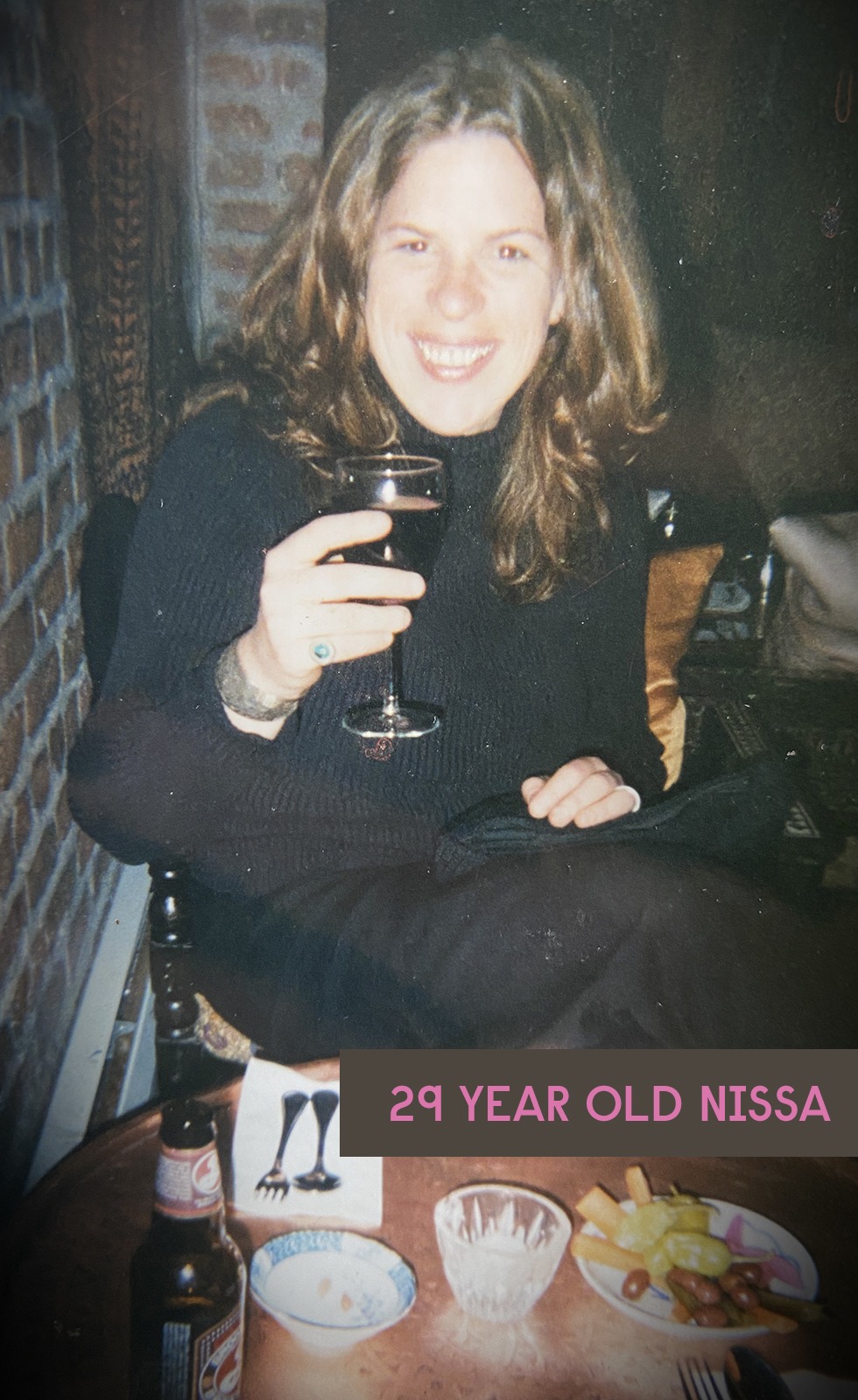
Alcoholism is known to have a great many factors. These factors certainly play into my brain’s capacity to control my drinking because I have a lot of the factors in my own history.
Genetic factors are an important contributor to potential alcoholism. My father was a serious alcoholic and comes from a family tree abundant with alcoholics. No one in the family really talks about it, or not as much as I think they should. One aunt progressed deeply into her alcoholism; she is no longer with us. Her alcoholism was the one that everyone talked about. I lived with her during some of her darkest days while my father was in jail for kidnapping us. There was something about her, in her overtness, in the way she couldn’t repress, that I appreciated. For whatever reason I was always able to accept her more and see her as having an illness rather than how I tended to see the functioning alcoholics in my life – as people who couldn’t get their shit together.
Everyone else in my family fell into the category of functional alcoholic. Those folks always bothered me more. “Functioning” in my mind is a matter of opinion. Years after I stayed with her, my aunt went on to get sober. I did get the privilege of seeing her during that stage of her life once. Interestingly, I saw in her the same woman I always saw, which isn’t quite what that sounds like. I always saw her as a human being struggling, but bits and pieces of the real her were always visible to me. She was always kind and, in her own way, was one of the only people on my dad’s side of the family that I really felt cared for me. In her pain, she could feel mine and I hers. There was something real about that experience that sits with me.
I feel a lot of guilt for not looking at my father and others the same way. Perhaps I looked at the people that I “needed” something from differently… with more contempt about how they were affecting me, whereas I just saw my aunt as a human being.
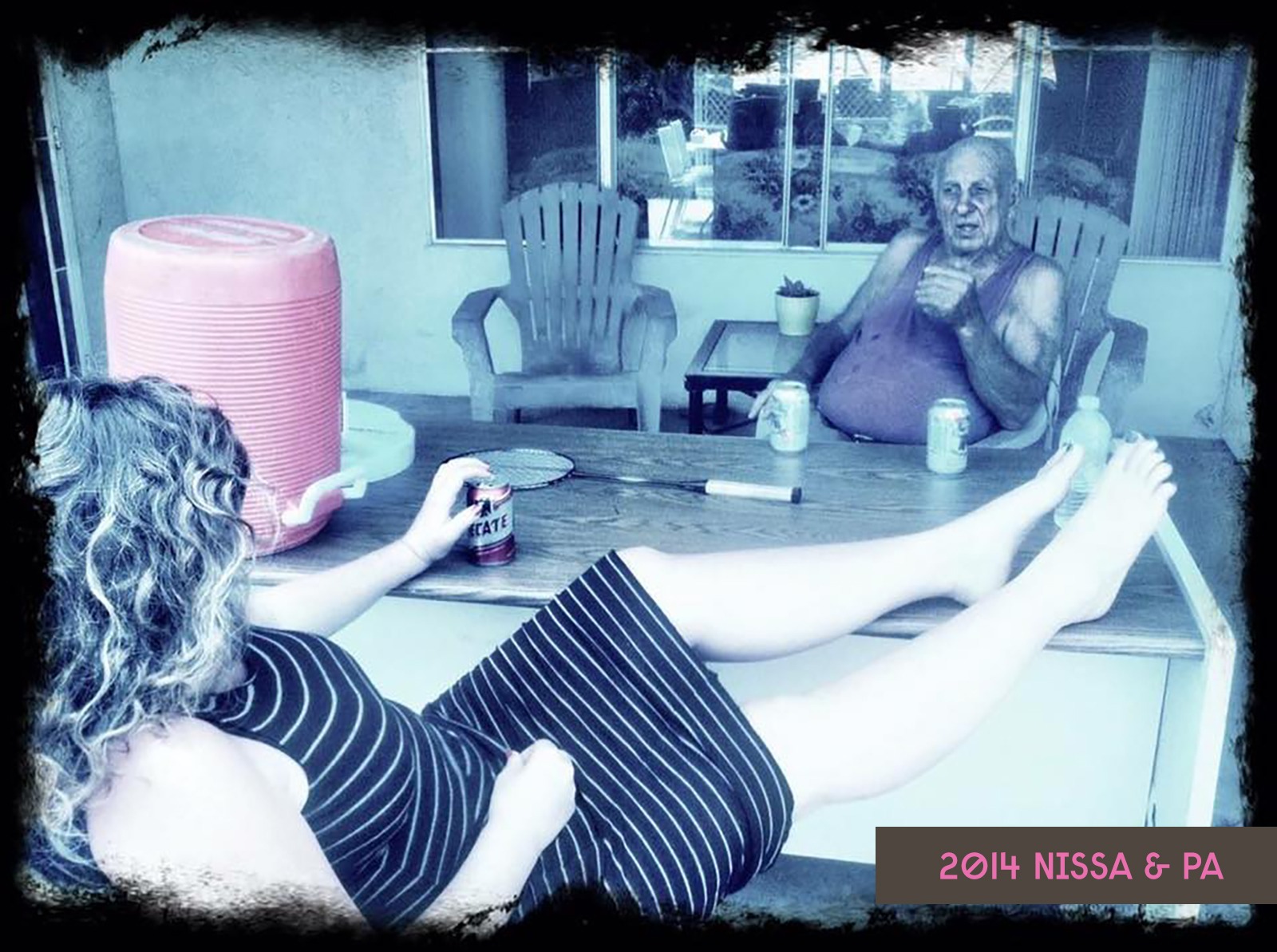
I can see this in retrospect with not just my father but a good friend of mine for my adult life. I feel guilty realizing and writing this because I failed at seeing others through the same lens as I saw my aunt – I.e., my father and those I thought did a poor job of loving me. I didn’t offer them the same kindness and acceptance, and, as I write this, I can feel how this was felt between us.
Many people I spoke too while writing this talked about trust being the most difficult thing about living or loving alcoholics. I think for kids whose parents are alcoholics, or partners or best friends; trusting the alcoholic in anyway is extraordinarily complex. Essentially, I didn’t need to trust my aunt so I could look at her differently than I did my father.
My father was the functional type of alcoholic and, maybe in a way more like me than not, he had just enough capacity to control his drinking over the years. That still doesn’t erase the story of his drinking or the people it affected along the way. Even if he could, in a way, “control” his drinking, by no means was his alcoholism minimal or docile in any manner since or before I was alive. This is what I mean by functioning. In my opinion, if you are not thriving, there is a problem. I have yet to meet a thriving active alcoholic.
My father, from what I was told, was a potent drunk for a quarter of his life. He lived to be 85 years old. We didn’t know him quite this way, and no one really talked much about it. By the time his last kid was born, he had quit all hard liquor and was just drinking beer… lots and lots of beer… so much so that we filled trash bins with cans after we kids lined them up in dominoes like rows to crush them with sledgehammers. I remember vividly how fun this was to do. I also remember the stench of the last remnants of beer that would squirt from the can as the hammer pounded it down. That same stench of old beer to this day makes me feel nauseous.
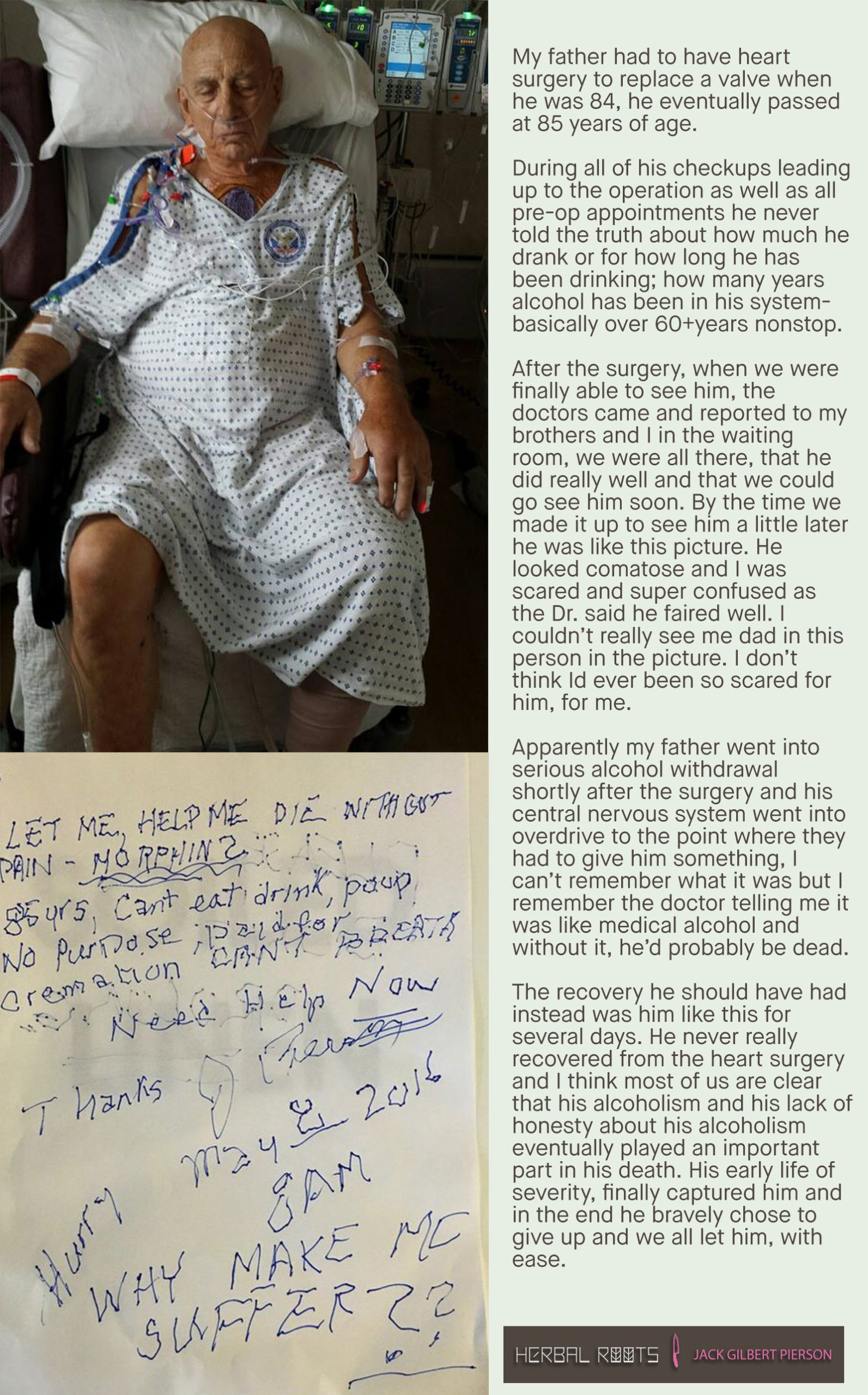
In my early years and before, my father was a serious alcoholic and, from what I can gather, suffered greatly and was filled with a great deal of anger. Of course, we as children don’t often see this part of our parents, and it’s usually much later in life that we may even possibly be aware that we check most of all of the environmental risk factors for alcoholism. Growing up in poverty, being raised in a violent household, having inattentive parents, seeing your mother physically abused, being verbally and physically abused by either or both parents, having dysfunctional family and community ties, and experiencing any sort of trauma are all contributing environmental factors that increase a person’s likelihood of abusing alcohol.
I can check off each one of those factors; although, it has taken me many years to readily admit that to anyone. Or even understand it myself. For many people, we just think this type of life is what everyone has and the fact that you lived through it is the only important aspect. Obviously today we know that is not the case
All of these environmental factors combined with my genetics, myself and my brothers are a high risk. It’s something I have spent a lot of time thinking about after years of therapy and life experiences alongside others trying to cope with similar experiences.
I often wonder about my father’s alcoholism. What was at the root of it for him? What was the trigger… the pain behind it? He was in the Korean war and grew up in a very macho America, but I know his pain ran deeper than this. I always sensed it. My biggest regret when it comes to my father is not asking him about his alcoholism. In the end he would speak to me about almost anything, but I don’t think he was ready for that talk.
I never judged my father for being an alcoholic, but I did come to understand that many of his actions while drunk brought about a great deal of pain for most of those around him, including my mother. Despite my dislike of her, I have always understood that her marriage and child rearing years were probably unbearable and that much of that is due to my father’s alcoholism. She brought her own baggage into the union so by no means was she fully a victim in her marriage (nor was my father). Neither does my father’s alcoholism excuse her abuse and neglect of her kids. This continued long after their divorce and had nothing to do with my father. What it does mean is alcoholism further complicates the difficult human experience of marriage and raising kids, let alone living in general.

One of the things I admire most about my father is in his ability to change and grow. He never was completely able to lay down the booze. He drank beer up until his heart surgery, which probably put him at more serious risk especially as he lied about his intake and when into a serious and unexpected detox after surgery.
He was “functional.” Unlike many alcoholics, he didn’t have to wake up and drink; he could wait until the day’s end. Where he was held hostage is in needing to have it every day, but, when I knew him, he was able to grow and thrive as a human being. His worst days as an alcoholic were mostly before my time or memory. I knew him as someone capable great change, with a great sense of humility and great power. He tried very hard to overcome his demons, mostly because of us. No doubt his authentic self was the powerful man I knew, and no doubt his alcoholism was powerful, too. Surely, he had to battle with it his entire life. I don’t think he was ever able to share this burden with others and I think, knowing him, that would have helped him.
I have never written about my father this way before, and it may seem surprising to some. Most of you have only heard the stories of how he fought for and even went to jail for his kids. You’ve probably heard the tales of the heroic journey to Central America with us four little kids in tow and how he is the man that helped lay the path down for me to become who I am… which I consider to be a pretty neat woman. The point to me sharing this side of my father is to remind us that this disease called alcoholism is something happening to people. It is not a sufficient descriptor or characterization of the people inflicted with it. Alcoholics simply suffer from an addiction that is bigger than them – that no will power, moral fortitude or simple good reason can easily stop. Even when that means it hurts people around them.
One of my favorite depictions of an alcoholic comes from the Little Prince – where the little prince visits the planet where only the “drunkard” lives. The Little Prince asks why the drunkard is drinking and the drunkard says because he is sad. The Little Prince asks why he is sad, and the drunkard says because he is drinking. This depiction is often affirmed by recovering alcoholics – the not-so-merry-go-round of addiction.
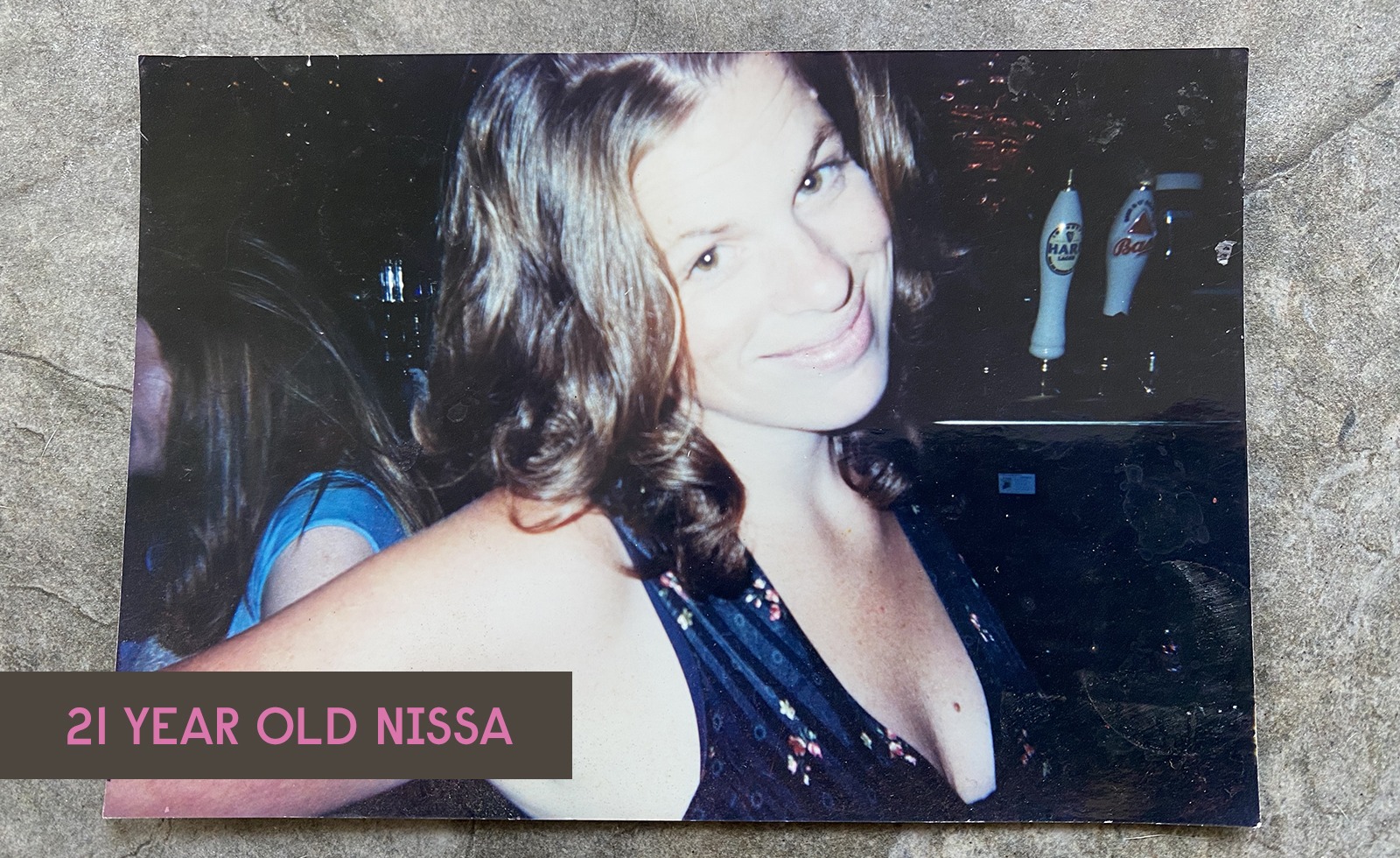
The dark sides of booze that I grew up seeing didn’t come just from my father and his family. It was wherever I looked. It’s funny how clearly you can see alcoholism when you grow up in it. Maybe in a way it becomes attractive through its familiarity.
While I’ve managed to stay just on the periphery of alcoholism, I continue to find myself surrounded by it to this day. When I was in college, I often drank to excess. I can still viscerally remember one specific puking episode that taught me a great lesson about drinking. That episode changed my trajectory; though, I’m not sure I was conscious of it at the time.
I was smart (or lucky) and chose to work in the local college bar while in college. It gave me all the benefits of being out at the bar around everyone and happy, but I wasn’t able to get drunk alongside the rest of them. Sure, I got drunk after work quite a bit but, in a sense, this job kept me safe, I think. It also gave me a look into what people are like drunk and how quickly personalities can change.
Mostly now, when it comes to booze, I still remain just on the periphery of it. I’m aware that drinking has both light and dark sides, and generally I don’t take issue with the idea of altering one’s mood. Still, I see how important it is to be careful, and I continue to see its destructive side in people I love dearly: in a love of my life, a best friend, several lovers, relatives and people that have worked for me. Each of these people have different histories, genetics, environmental factors, etc. that characterized their alcoholism. Each has experienced the damage of alcoholism on a lot of important parts of their lives, but, in each of them, I see my aunt and my father – both the alcoholic and the beautiful human being behind the pain of alcoholism.
I realized a long time ago that it’s not something I can fix or change in any of them. In a few of these cases, it has severely damaged the beautiful and long-lasting relationships we have to the point of excruciating pain.
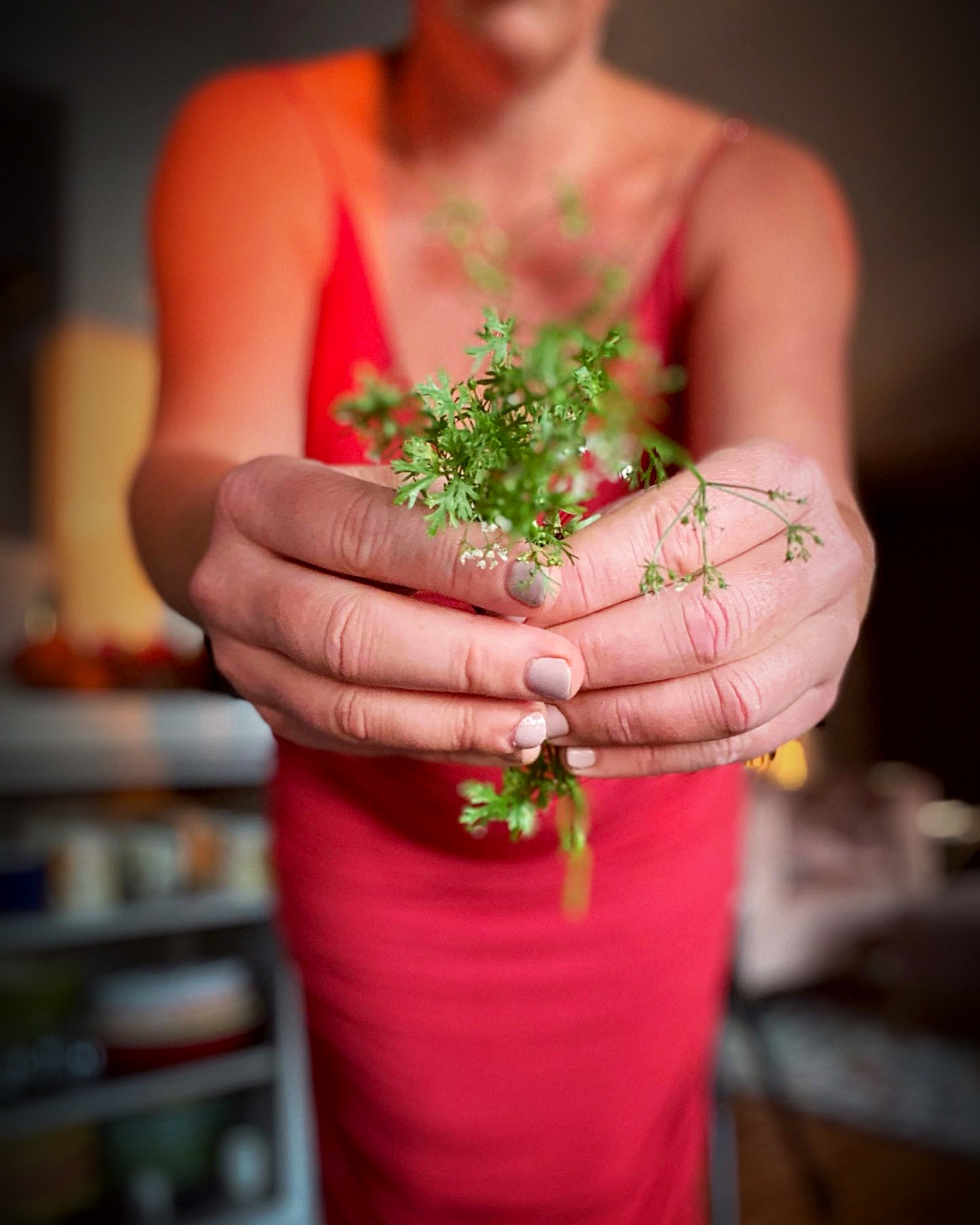
But here I sit in Missouri with new alcoholics entering my life and with my own grinding pain of loneliness often leading me to want to drink more. It has taken a lot of effort lately to push the booze aside, as I feel how easily it can be to slip from slightly altering mood to self-medicating bigger pains that will never be addressed within myself if I am drinking.
This latest battle with wanting to grab more booze has, of course, thus far been quelled by the mechanism in my brain that allows me to say no. Missouri’s lack of good booze also helps.
I’m not going to lie; my tastes are specific, and I don’t compromise. This again reminds me that I am not my aunt with bottles of cheap vodka in every room of the house.
I recently took a month off of drinking, something that I generally do a few times a year mainly to remind myself that I am capable. This last time was the hardest. Living here is lonely. Like most, I have a lot of things happening that we don’t all see… love, matters of the heart, family, work… all of it happening and all of it has been really hard lately. I started to get pissed at the lack of options for nondrinkers and, since my local grocery stores here are mostly filled with shitty sparkling water, my usual drinking sparking water in a wine glass wasn’t doing it for me.
I ran across a book Gazoz: The Art of Making Magical, Seasonal Sparkling Drinks, the art of making magical seasonal sparking beverages, and moved down a rabbit hole into lightly fermented fruit drinks, which I hadn’t really heard of. I hate kombucha, so I probably just assumed anything fermented was that. Regular mocktails tend to be too sweet for me. One of the things I like about alcohol is that the spirit can be used to add depth but not sweetness. I am good at making. I know how to add depth and layered flavor, but these new lightly fermented fruit syrups really gave me a similar enjoyment to a well-crafted cocktail. Being able to flavor them with spices, herbs, and anything I want also made them incredibly artistic, and so I played and played.
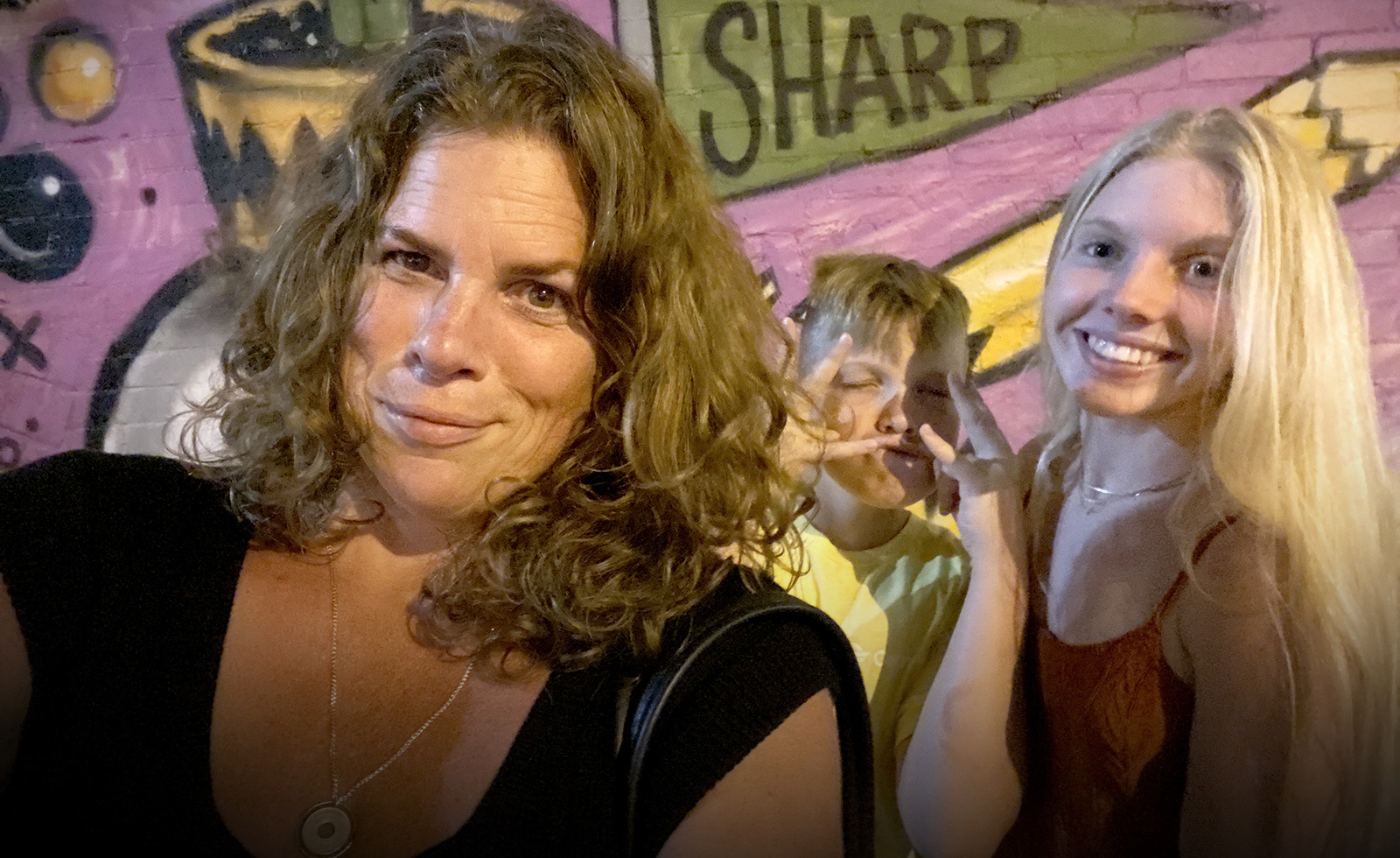
Around the same time, I took my niece and nephew to Kansas City, and we indulged in some high-end farm to table style restaurants. My nephew is one of the best mixologists. I taught him how to make mocktails a while ago. He’s amazing and better than most bartenders, he has deep intuition in crafting drinks. I teach all the kids because I refuse to buy them sugary drinks, and this allows them to get to know their flavors and taste and learn to craft their food. Everywhere we went they wanted to give him a Shirley Temple. I thought this could not be what they are feeding the growing number of nondrinkers out there.
I grew extremely disappointed, not just feeling badly for all the young people out there that want to taste something delicious, but I started to viscerally feel how difficult it is to be out there in the world sober. Feeling a bit like the world has chosen to toss aside the sober for the money and excitement of the drunk. That those who have chosen the courageous path of sobriety seem to be relegated to the kid’s table of life.
It seems that we should have much more balance out there, it seems that there should be more advocates. It seems more people should be talking about the dark side. I’ve been choosing to more often and more often not drinking alcohol. I find it interesting that most of the kids and young adults around me notice when I choose not to drink. They see the dark side, and not because I get drunk and crazy, but because they see a bigger picture… a bigger pattern. Don’t we all see that?
I think for someone like me who’s a risk – especially now in Missouri – I have to be careful. I also feel the need to be open and vulnerable, not because I have some great wisdom or even exceptional writing skills, but because I, like many of the people choosing to be sober, am courageous and I want to try to open this discussion more, in the very least with my friends and family who may read this.
Likewise, I must share my mad skills of concocting delicious non-alcoholic summer fruit beverages. This time sharing the new skills I have learned in making lightly fermented fruit, herb and spice syrups and transforming them into simple and magical drinks that have no dark side!
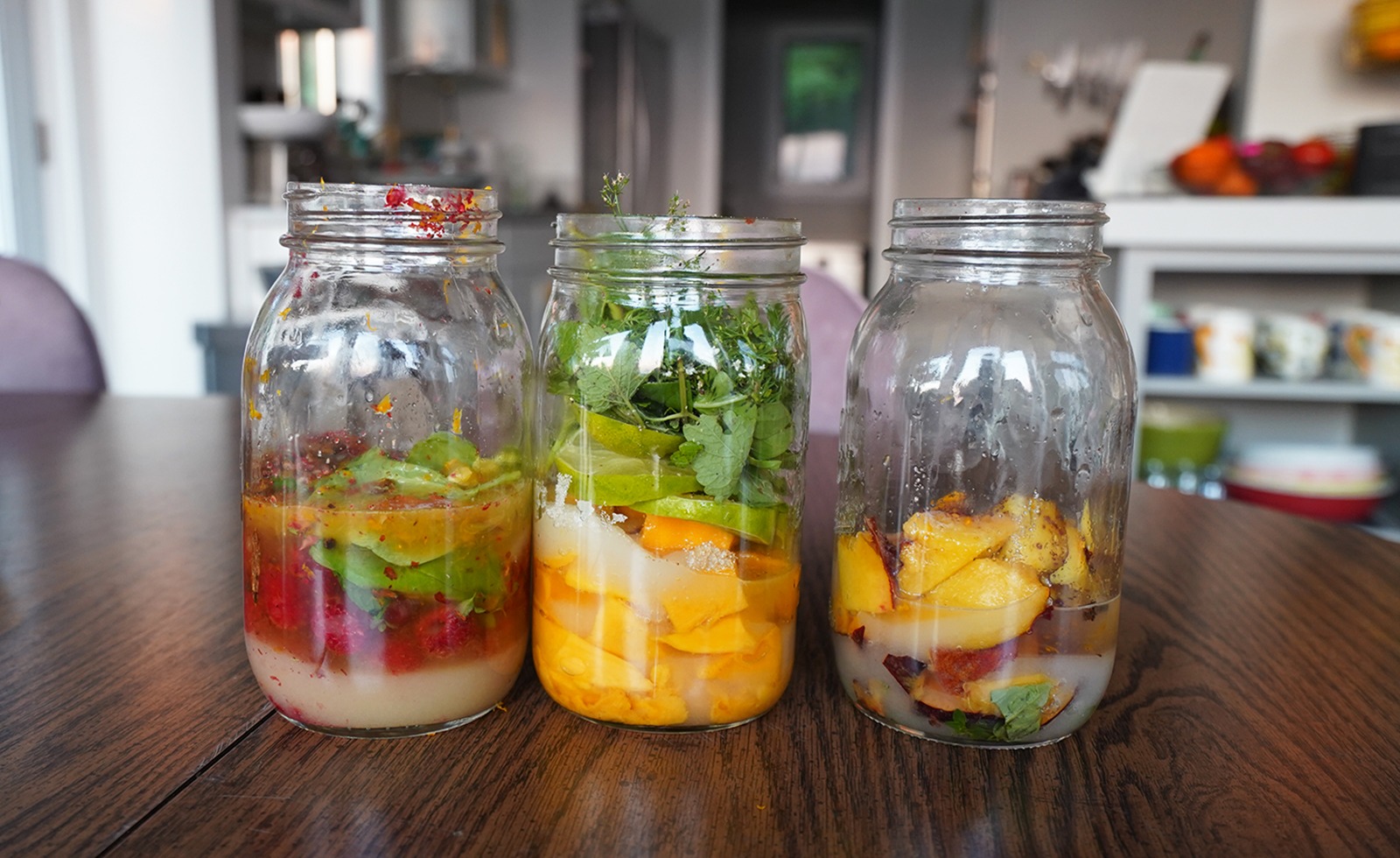
The Lightly Fermented Summer Fruit, Herb & Spice Syrups
As I mentioned above, I stumbled upon the book Gazoz: The Art of Making Magical, Seasonal Sparkling Drinks which celebrates and demonstrates the genius of Tel Aviv legend Benny Briga and his sparkling water drinks infused with fruit, spices, flowers and herbs. Long an admirer of Israel’s amazing selection of nonalcoholic drinks, and specifically sparkling fruit beverages, I was immediately intrigued.
I had spent a great deal of time in Israel over the years for my organic agricultural work and a lot of time in Tel Aviv and one of the many things I love about Tel Aviv is how non-alcoholic drinks there are common and delicious. By no means am I implying that the alcohol scene is mild there or that the dark side of that doesn’t exist. There is a booming and beautiful craft cocktail and beer scene, and some of my favorite wines are produced in Israel. Alcohol is just as accessible there as anywhere else. The difference is that the nonalcoholic options are as well, and I’m not talking coca cola and sprite. I’m talking about fresh mint icy limeades, fresh cherry beverages, and creamy tahini frothy things. No matter where you go, nonalcoholic options are abundant, fresh and utterly delicious.
The book is timely in that here in the US we are starting to see more of moment toward non alcoholic beverages, although it seems to be dominated with kombucha offerings. I’d argue that we (Americans) tend to do less fresh and more processed than most other countries, and we are therefore behind. More reason to keep pushing it, not just where it already thrives in places like LA and NYC or San Fran but also places like here in Missouri where even the booze options seem overly processed and laden with sugar.
With these simple to make syrups, we get fresh and taste the depth that we can create with spices and herbs. I, of course, like Mr. Briga use a lot of herbs and spices that most people don’t have, but it’s the concept that matters. Use what you have, experiment, do it lightly – play.
I often always have fruit that goes bad in the summer because I can’t eat it fast enough or time it right. Normally I freeze this fruit for pies but, after discovering this simple technique, I pop it into a mason jar before if goes bad and play. The result is a really refreshing zero proof drink with lots of character and depth.
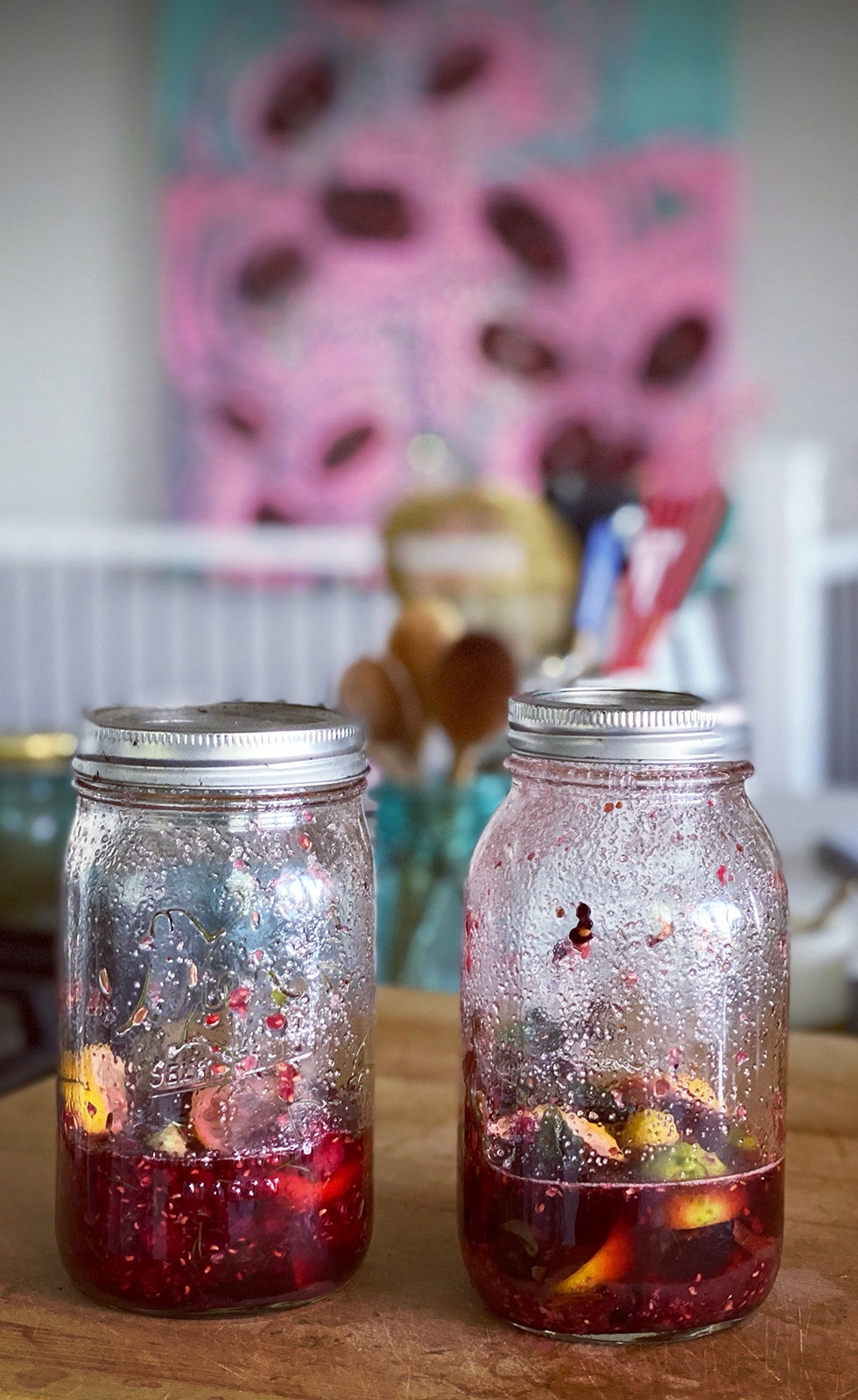
Fermented Fruit, Herb & Spice Syrup
Makes 1 quart
Each mason jar makes enough for several mocktails or 1 pitcher of fermented fruit punch. You can use the syrups to craft mocktails by adding faux gin or bitters or go the easy route and simply combining with sparkling water.
The process is relatively simple. Add some sugar, fruit, herbs, spice and citrus to a mason jar and leave on the counter about 3-4 days. The mixture lightly ferments creating a tingly and tasty delight.
Here are the 4 connections I did and easy alternatives since I used lots of wacky herbs and spices!
Raspberry Lemon Basil
1 cup raspberries
1 cup sugar
Zest of 1 Meyer lemon
Juice of 2 Meyer lemons
1 tablespoon orange zest
handful of ripped lemon basil leaves
handful of spearmint leaves
1 teaspoon cracked pink peppercorns
1 teaspoon rose tea
A few cinnamon verum shavings or ¼ teaspoon cinnamon
A few dried orange slices
Optional:
Handful of coriander flowers
¼ teaspoon grains of paradise
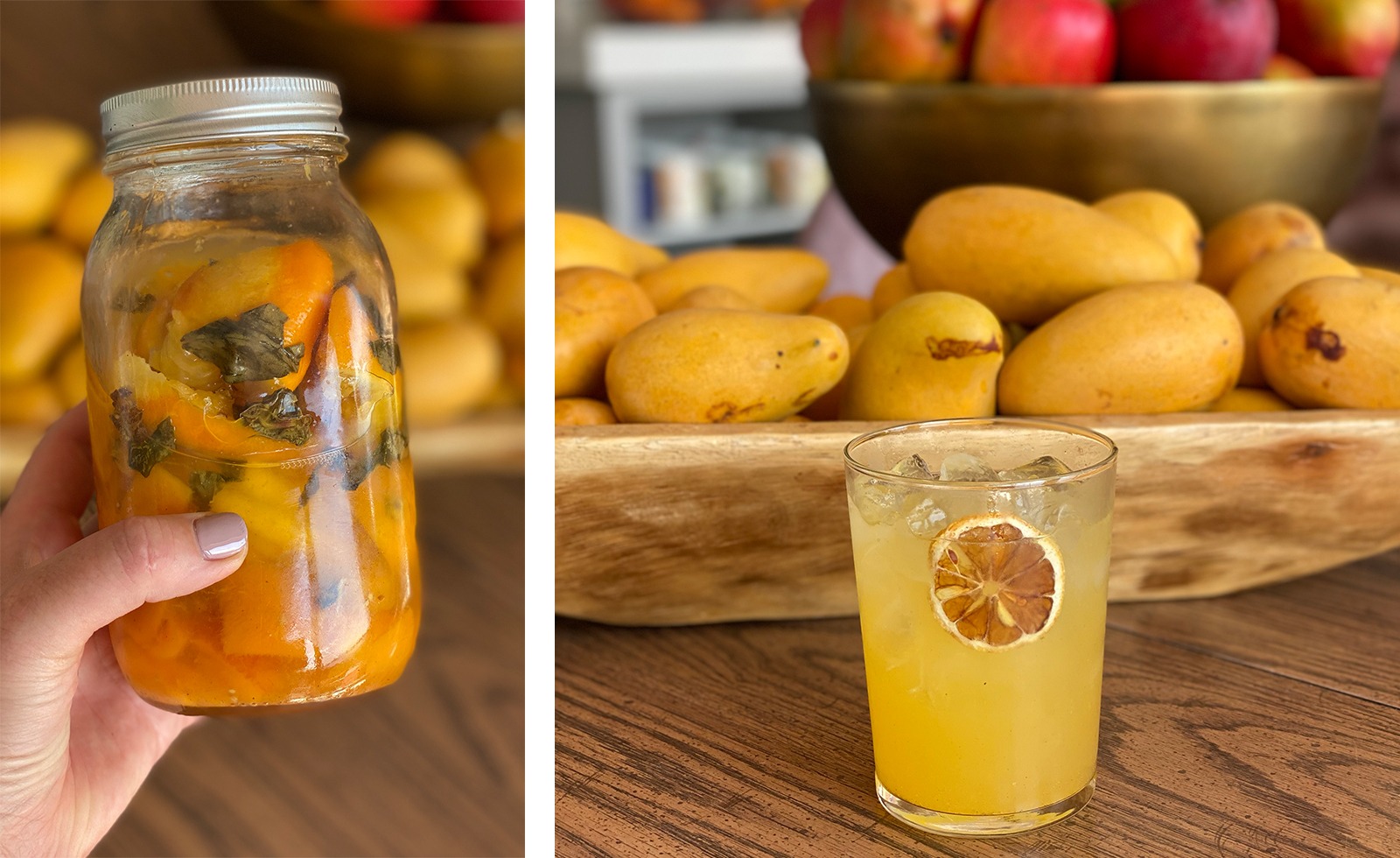
Mango Thai Basil
1 cup cubed mangoes
½ cup sugar
Zest of 2 limes
Juice of 2 limes
Handful of cilantro leaves
Handful of thai basil leaves
1 star anise, cracked
Optional:
Handful of calendula leaves
Handful of rau rum (Vietnamese coriander)
1 teaspoon cracked purple peppercorns
2 tablespoons champagne vinegar
Peach Basil
3 medium peaches cubed
¾ cup sugar
Big handful of basil leaves, ripped
Zest of 1 Meyer lemon
Juice of 1 Meyer lemon
¼ teaspoon ground turmeric
1 pinch sumac
¼ teaspoon cinnamon
1 clove, cracked
Cherry African Blue Bush Basil
1 cup pitted cherries cut in half
1 cup sugar
Juice of 1 lemon
1 teaspoon white pepper, cracked
¼ teaspoon jasmine tea
¼ teaspoon rose tea
1 tablespoon pomegranate vinegar
Directions
Place all of the ingredients in a mason jar. Cover and shake well. Release all the trapped air and then leave on your countertop in a cool, non-bright location for three to four days. Open the mason jars daily to release any trapped gasses that begin to occur as the fruit begins fermentation.
Fill the jars with hot water and stir well. Strain using a fine mesh strainer pushing out and extracting every single drop of juice. Discard the solids and place the syrup back in the mason jar and refrigerate. The syrup will keep for a few weeks, after the first week it loses its vibrant flavor but still tastes good.
Mix the syrup with sparkling water or use it to craft your favorite mocktail!




